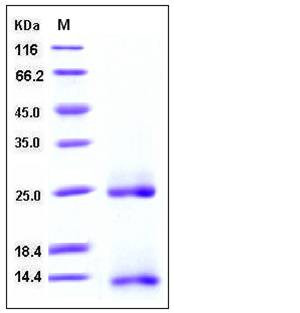| Catalog Number |
P10426-HNAE |
| Organism Species |
Human |
| Host |
E. coli |
| Synonyms |
BDA2,BDA2A,BMP-2,BMP2A |
| Molecular Weight |
The recombinant human BMP2 monomer consists of 115 amino acids and has a predicted molecular mass of 13 kDa. |
| predicted N |
Met |
| SDS-PAGE |
 |
| Purity |
> 95 % as determined by SDS-PAGE |
| Protein Construction |
A DNA sequence encoding the mature form of human BMP2 (NP_001191.1) (Gln283-Arg396) was expressed. The mature form sequences of human, mouse, rat, rhesus and canine BMP2 are identical. |
| Bio-activity |
Measured by its ability to induce alkaline phosphatase production by MC3T3-E1 mouse osteoblastic cells. The ED50 for this effect is typically 0.5-2 μg/ml. |
| Research Area |
Immunology |Signal Transduction |Cytoskeleton / ECM |Extracellular Matrix |Structures |Bone | |
| Formulation |
Lyophilized from sterile 30 % CAN, 0.1 % TFA, pH |
| Background |
BMP-2 protein, like other bone morphogenetic proteins, plays an important role in the development of bone and cartilage. BMP-2 protein is involved in the hedgehog pathway, TGF beta signaling pathway, and cytokine-cytokine receptor interaction. BMP-2 and BMP-7 are osteogenic BMPs that have been demonstrated to potently induce osteoblast differentiation in a variety of cell types. BMP-2, BMP-4 and BMP-7 are known to be of major importance in bone formation and repair. In cancerous tissues BMP-2 protein may play an important role in the progression of glioma. |
| Reference |
Jiao X, et al. (2007) Heparan sulfate proteoglycans (HSPGs) modulate BMP-2 osteogenic bioactivity in C2C12 cells. J Biol Chem. 282(2):1080-6. Michon F, et al. (2008) BMP-2 and BMP-7 play antagonistic roles in feather induction. Development 135 (16):2797-805. |

